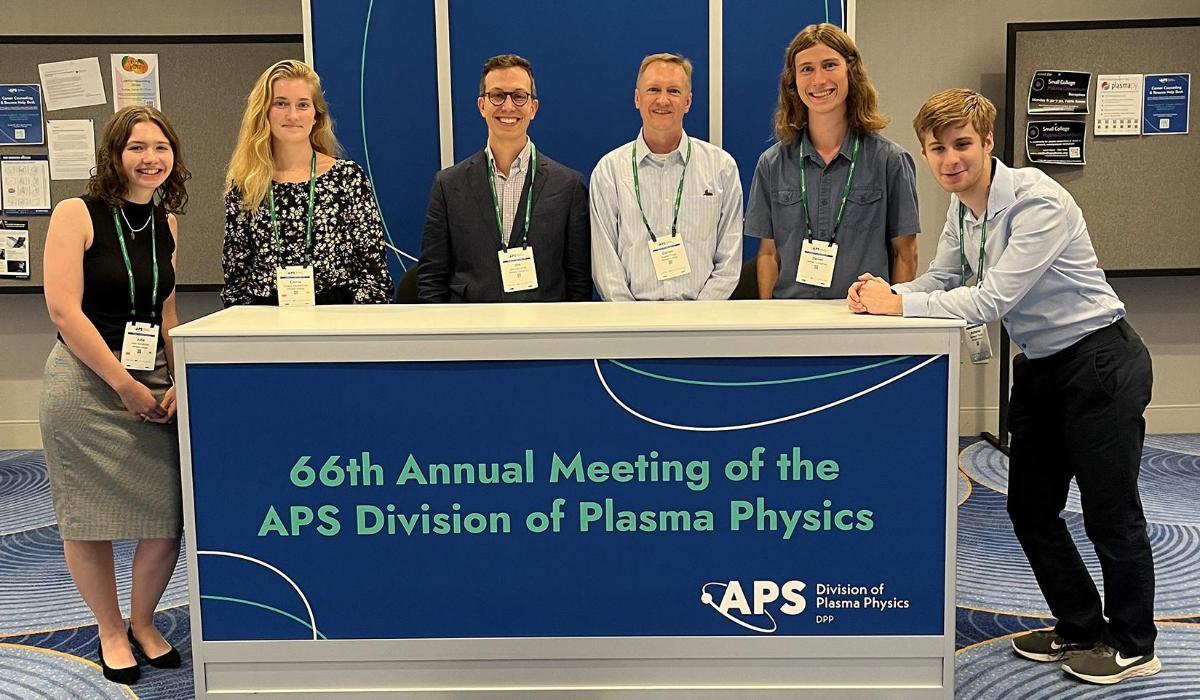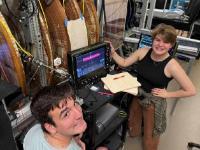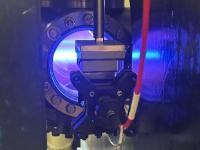The Physics and Engineering Department offers a wide array of research opportunities on campus at Wheaton.

Dr. Darren Craig and Dr. Jim Schroeder with Wheaton undergraduate students, Julia Nordstrom ('25), Emma VanderKooi ('25), Daniel Humphrey ('24), and Nathaniel Tarullo ('26) at the American Physical Society (APS) Division of Plasma Physics (DPP) in Atlanta, Georgia in October 2024. APS is the US national organization for physicists founded in 1899 and hosts a Global Summit for Physics, the largest physics research conference in the world. DPP 's, founded in 1959, primary aim "is the advancement and dissemination of the knowledge, understanding, and applications of plasmas." Plasma research includes the study of nuclear fusion, research in astrophysical plasmas and the practical applications of plasmas for different industries. Dr. Craig's primary research interest is fundamental plasma physics with applications in fusion and astrophysics. Dr. Schroeder’s primary interest is fundamental plasma physics with applications in space physics. Wheaton undergraduate students often travel with faculty to present posters on research topics in national scientific conferences.
Honors Thesis
Students with a GPA of 3.70 in the major and 3.50 overall may complete an honors thesis and receive an honors designation on their transcript upon graduation. An approved research project is a central component of the honors program. A written thesis summarizing the research project and its conclusions must be completed and defended orally to receive the honors designation. Contact the department chair for more details.
| Name | Title |
|---|---|
| Logan Grove 2025 | Characterizing Gaussian Quantum Processes With Gaussian Resources Advisor: Dr. Kevin Valson Jacob |
| Daniel Humphrey 2024 |
Sheared Plasma Arcade Simulation Advisor: Dr. Darren Craig |
| Jodie McLennan 2021 |
Plasma Flow In Wheaton Impulsive Reconnection Experiment (WIRX) Advisor: Dr. Darren Craig |
| Michael Vieceli 2020 |
Classifier Performance of Radiomic Features from Breast Lesions Imaged Using DCE-MRI Advisor: Dr. Heather M. Whitney |
| Elizabeth H Tan 2019 |
Wheaton Impulsive Reconnection eXperiment (WIRX) Waves In Two-Ribbon Arcades Advisor: Dr. Darren Craig |
| April Futch 2018 |
Investigating the Role of Resistivity and Viscosity in the Sawtooth Cycle Advisor: Dr. Darren Craig |
| David Barbalas 2017 |
Effects of Hotspot Limited Mass Accretion on Electron Capture Supernovae in Binary Systems Advisor: |
| Maddie Baltzer 2016 |
First Absolute Wavelength Calibration of Ion Doppler Spectrometer at Madison Symmetric Torus Advisor: Dr. Darren Craig |
| Spencer Hills 2016 |
Investigation of Effects of Lower Metalicities on ECSN Channel in Binary Stars Advisor: Dr. Arend (AJ) Poelarends |
| Emily Willson 2016 |
Towards a Quantitative Understanding of Radiation Damping Effects on Magnetization Transfer Parameters Advisor: Dr. Heather M. Whitney |
| John Ginn 2015 |
Understanding Radiation Damping in the Context of Magnetization Transfer Advisor: Dr. Darren Craig |
| David Martin 2015 |
Magnetic Field and Velocity Fluctuations with and without a Reversal Surface in the RFP Advisor: Dr. Darren Craig |
| Michael Morken 2015 |
A Model for Plasma Temperature and Density in WIRX Advisor: Dr. Darren Craig |
| James Tarka 2015 |
Non-Conservative Evolution: Implementation in the Stellar Evolution Code MESA and Outlook on ECSN Progenitors in Binary Systems Advisor: Dr. Arend (AJ) Poelarends |
| Cole Adams 2013 |
Electron Capture Supernovae in Binary Systems Advisor: Dr. Arend (AJ) Poelarends |
| Mindy Cartolano 2013 |
Exploring the Variability of Ion Heating at Reconnection Events in the Madison Symmetric Torus Advisor: Dr. Darren Craig |
| David Blasing 2011 |
Temperature and Density in the Wheaton Impulsive Reconnection Experiment (WIRX) Advisor: Dr. Darren Craig |
| Joel Dahlin 2010 |
Assessment of Quasi-Separatrix Layers Advisor: Dr. Darren Craig |
Summer Student Research Projects
Kyle Schauer
Mentor: Dr. Darren Craig
Objective: Create a database that collects and aggregates data from the new solar and battery installation to be used by faculty and students for research, class projects, or in class demos.
 Maia Peterson
Maia Peterson
Mentor: Dr. James Schroeder
Objective: Learn the theory behind a Langmuir probe, then design and build one for the lab including its sweep circuit and feedthrough.
Josh Whelan
Mentor: Dr. James Schroeder
Objective: The main objective of our research was to construct a Langmuir probe, aka a probe that can tell us density and temperature of a plasma.
 Nathaniel Tarullo
Nathaniel Tarullo
Mentor: Dr. James Schroeder
Objective: To simulate whistler wave behavior and particle interaction with a whistler wave in laboratory conditions. Whistler waves are an electromagnetic wave found in plasmas which we wanted to understand better along with particle interactions with them in the laboratory. They have already been studied and simulated in space, but as far as we know, no research simulating their behavior in the lab.
These students have worked with faculty in our Summer Research program:
Summer 2024
- Nathaniel Tarullo (’26) and Daniel Humphrey (’24) worked with Dr. Craig
- Nathaniel Tarullo ('26) worked on the Wheaton Impulsive Reconnection eXperiment (WIRX)
- Andrew Lamb (’25), Julia Nordstrom (’25), and Emma VanderKooi (’25) worked with Dr. Schroeder
- Andrew Lamb ('25) and Emma VanderKooi ('25) worked on the Development Of A New Helicon Plasma Source In The Wheaton Linear Plasma Device
- Julia Nordstrom ('25) worked on A Phased Array For Laboratory Testing Of Radiation Belt Whistler-Mode Wave Dynamics
- Logan Grove (’25) and Phillip Sampson (’26) worked with Dr. Valson
- Logan Grove ('25) worked on Characterizing Gaussian quantum processes with Gaussian resources
- Sam Schutz (’26), Juliana Norman (’27), and Sam Kendall (’25) worked with Dr. Vazquez
Summer 2023
- Wes McAuley (’25) worked with Dr. Craig
External Research Opportunities (REU)
Research Experiences for Undergraduate (REU) programs exist at many institutions, typically in the summer with application deadlines normally in December-February. The department provides an annual REU info night for students in the fall semester, maintains for students a collection of REU programs with links to their applications, and provides advising for students interested in applying for these opportunities.
Genevieve Nelson (B.S. Applied Physics '22): Genevieve participated in an REU in Summer 2021 with Dr. John Neumeier in Montana State University. She designed, machined, and tested a sapphire dilatometric cell for measuring the thermal expansion of solids. She is continuing to work with Dr. Neumeier to further develop and test the cell throughout the fall. They are also working on writing an article describing their process and results.
Nathaniel Bowden (B.S. Physics and B.A. Spanish '21): Nathaniel completed a SULI internship at Argonne National Lab on accelerator physics applications of machine learning
Michelle de Oliveira (B.S. Applied Physics ’21): Michelle started working in Spring 2020 on research in medical physics research with Dr. Heather M. Whitney on comparison of classifier performance in computer aided diagnosis of breast cancer using radiomic features extracted from DCE-MR images. Michelle presented her work at the 2021 meeting of SPIE: Medical Imaging. Michelle also participated in an REU at Ohio Wesleyan University on disease vector modeling and in the lab of Dr. Nate Thom at Wheaton College.
Austin Richardson (B.S. Applied Physics ‘21): Austin worked with Dr. Jim Schroeder over the summer of 2019 to build a high vacuum system for plasma physics research.
Michael Vieceli (B.S. Physics ’20): Michael worked from Fall 2018 through Spring 2020 on research in medical physics with Dr. Heather M. Whitney on repeatability of classification in computer aided diagnosis of breast cancer using radiomic features extracted from DCE-MR images. and the as well as in a senior honors thesis.
Griffin Walker (B.S. Physics ‘19): Griffin participated in an REU at St. Mary's College of Maryland on Knot Theory.
Emily (Willson) Wenger (B.S. Mathematics and Physics ‘16): Emily worked in a mathematics internship with the Department of Defense developing analytical and statistical tools to solve a computer networking problem of national defense interest. She also worked with Dr. Heather M. Whitney on simulations of radiation damping in nuclear magnetic resonance, completing an honors thesis. Emily presented her work at the annual meeting of the International Society of Magnetic Resonance in Medicine.
John Ginn (B.S. Physics ‘15): John conducted research with Dr. Heather M. Whitney on radiation damping in nuclear magnetic resonance, including making semisolid samples for nuclear magnetic resonance and conducting experiments on them.
Daniel Flavin (B.S. Physics Secondary Education ‘14): Daniel conducted research with Dr. Heather M. Whitney on carotid artery imaging using ultrasound, working on making phantoms and analyzing data.
Andrew Keeler (B.S. Physics ‘13): Andrew conducted research with Dr. Heather M. Whitney on radiation damping in nuclear magnetic resonance.
Rebecca (Russ) McCordic (B.S. Physics ‘13): Rebecca conducted research with Dr. Heather M. Whitney on carotid artery imaging using ultrasound, working on making phantoms and analyzing data. Rebecca also worked in a research experience at Elmhurst College, where she worked with lasers and scanning devices to identify an optimal low-cost light diffraction imaging setup.